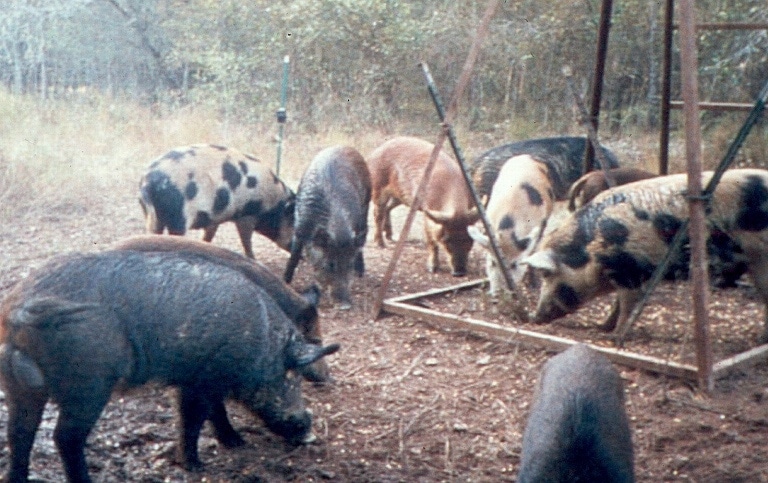Feral Hog Webinar Focuses on Disease Risks
Feral hogs cause various kinds of agricultural and environmental damage across the Southwest, mostly by rooting, wallowing and depredation, according to a report by Logan Hawkes in Southwest Farm Press, http://southwestfarmpress.com/management/webinar-focus-risks-feral-hog-diseases-texas.
October 24, 2012

Feral hogs cause various kinds of agricultural and environmental damage across the Southwest, mostly by rooting, wallowing and depredation, according to a report by Logan Hawkes in Southwest Farm Press, http://southwestfarmpress.com/management/webinar-focus-risks-feral-hog-diseases-texas.
They are known to eat seeds, seedlings, mature crops, hay, turf and gardens. Their rooting often damages crops in just about every corner of the state.
With an exploding population estimate as high as two million feral hogs in Texas alone, wildlife biologists are warning that in addition to crop damages, these non-domestic scavengers also pose a risk of spreading animal diseases and parasites that could further their financial liability.
The concern for and risks of disease transmitted by wild hogs is so great that a webinar dealing with the problem has been planned for Nov. 20 at the Texas A&M AgriLife Extension Service office in Suite 208 of Conroy Square, 3355 Cherry Ridge Drive in San Antonio. The Feral Hog Community of Practice webinar is a resource made available by various land-grant university and other experts focusing on control, adaptive management, biology, economics, disease risks and human interface with feral hogs across the United States.
“Despite all the control efforts, feral hog numbers in the state (Texas) continue to rise at an alarming rate,” says Bryan Davis, AgriLife Extension agent in Bexar County. “Many diseases, such as swine brucellosis, pseudorabies, tuberculosis and tularemia, are associated with feral hogs. This webinar is designed to provide useful information on how to help prevent the spread of these diseases by feral hogs.”
According to webinar organizers, biologists are beginning to understand that feral hogs are extremely susceptible to a variety of infectious and parasitic diseases. External parasites include fleas, lice and ticks. Internal parasites include roundworms, liver flukes, kidney worms, lung worms, stomach worms and whipworms.
Of greater concern are more deadly diseases that can spread to wildlife, livestock and, in some cases, to humans. They include tuberculosis, brucellosis, trichinosis, leptospirosis, plague and anthrax.
Among diseases spread by feral hogs and of most concern for agriculture is pseudorabies, which can be fatal to cattle, sheep, goats, horses, skunks, raccoons and even cats and mice. The disease is a special concern to swine producers as it often causes abortions and stillbirths among domestic swine. Pseudorabies is not related to rabies and does not infect humans. It was eradicated from the domestic swine population in the United States many years ago.
In addition, swine brucellosis, a disease spread among animals and humans, causes abortions in sows and can cause infertility in boars. Spread through reproductive discharge, an infected hog becomes a carrier for life. The disease is contagious to humans but can be treated with antibiotics. There is no cure for infected livestock.
According to a study, “Feral Hogs in Texas” prepared by Mark E. Mapston, District Supervisor, Texas Cooperative Extension Wildlife Services, foot-and-mouth disease is a foreign animal disease of great concern because it is highly contagious, spreads rapidly, can cause serious economic losses, and can constrain international trade in livestock products. It is a viral disease of ungulates (mainly cloven-hoofed ruminants, including swine) and some rodents. It does not affect humans, but humans can spread the virus.
There is no known cure. The virus can be spread by contact with infected animals and with contaminated feed, water or equipment.
Livestock should be vaccinated appropriately, especially if they may have contact with feral hogs. Anyone who handles a feral hog should wear rubber gloves, particularly if contacting blood or reproductive organs.
The webinar begins with registration and a light lunch from 11:15 a.m. to noon, followed by presentation on feral hog disease issues from noon to 1 p.m. and feral hog control techniques from 1 to 2 p.m.
“Our goal is that farmers, ranchers and other landowners will get critical information, resources and expert application of knowledge on issues related to feral hogs from this and other webinars presented through this community of practice,” Davis says.
Registration is $15 on or before Nov. 19 and $20 thereafter. To register and/or for more information, contact Angel Torres at (210) 467-6575 or [email protected]
You May Also Like



